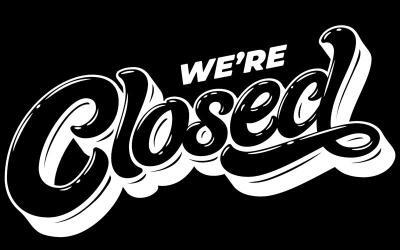All businesses go through ups and downs, and many will suffer cash flow crises. After some tough times, you may be tempted to walk away from your business – but closing down a business is not a decision that you should make in a fit of frustration.
Starting a business is so exciting, but the day-to-day grind of running a small business can wear down even the most intrepid entrepreneur.
That said, if you decide this path is the right decision, here is a comprehensive closing a business checklist that will highlight some of the big issues that you will need to work through.
Ten Steps to Closing Down a Business
1. Evaluate Your Decision
Take some time and get distance and perspective. What’s really going on? Can you solicit the help of your customers and raving fans to get you through this difficult patch?
Do you have some product or service that you could sell at a discount to bring in quick cash?
Are you having difficulty paying your vendors on time? Can you negotiate more favorable terms and take a little of the heat off?
Make sure that you have tried everything to fix things so that you don’t have any regrets if you do decide to walk away. Closing a business is very stressful personally and financially.
Doug Nohe is a small business consultant, strategist, advisor, and serial entrepreneur. He cautions:
“When making the decision to close your business, ensure that you have considered every other alternative first. There is nothing worse than looking back after you close and realizing you have regrets because you made the wrong long-term decision due to short-term issues.”
2. Seek Wise Counsel
If you’re closing down a business, you could also well be in financial distress. You may think you can’t afford to hire a lawyer, but you probably will need to. And, there are free resources that can help, as well.
Nohe advises:
“Don’t make this decision alone, consult with other business owners and advisors to ensure that there is no other alternative. Meet with a mentor from an organization like SCORE to get free advice about different options you can try that may save the business. If closing is the right decision, advisors also can help you to understand all of the legal, financial and personal requirements for doing so.”
Regarding attorneys, you will most likely want to consider one who has a specialty in negotiating debt – or even bankruptcy.
3. Identify Any Personal Liability
When you start a business, your credit is the business’s credit and you need to identify any personal liability that you may have regarding paying back loans, etc.
When you are negotiating with lenders, you may have to play hardball and even threaten bankruptcy as a final option (hopefully, it won’t have to come to that).
One former business owner noted that some loans may also be liens on the business, which can make the business more difficult to sell, since the liens and their liability would then be transferred to the buyer.
If this is true for you, you may actually need to pay those loans off personally before you can sell the business.
4. Sell the Business (if Possible)
Maybe a competitor, vendor, or another interested party would be willing to buy your business? If so, have realistic expectations for what someone might be willing to pay and realize that over the course of the negotiations, the offering price may go down a few times.
Another option that you can consider, depending on the type of business, is hiring a business broker.
Unfortunately, a buyer usually does have the upper hand in these negotiations and you may end up settling for a 40% reduction in what you believe is the value of your business, or 60 cents on the dollar (or less).
In an ideal situation, you can sell the business with the contingency that there is a job for you. Depending on your industry and expertise, you may be able to write yourself a contract for a year or more because you have some knowledge or connection that is critical to the business’s success.
Even if you can’t negotiate a place for you, selling the business as a complete package is much easier for you.
5. Transfer Intellectual Property and Shut Down Online Presence
If you can’t find a buyer for the entire business, can you generate value from selling the website or domain name? Can you get some money for transferring your phone number, customer lists or other intellectual property to a competitor?
Daliah Saper, intellectual property, media, and business attorney at Saper Law, says:
“Intellectual property (“IP”), just like all your other property, needs to be properly divided or sold when a business breaks up. It can be hard to value IP, but there are lots of firms that specialize in doing so. Alternatively, one partner may decide to buy the IP from the other partner, in which case, the purchase price should be negotiated as part of the break-up. With respect to social media and website accounts, because they are tied to your trademarks and copyrights, anyone who gets your trademarks and copyrights will also typically acquire any associated online accounts.”
6. Get Out of Your Lease
Often, commercial leases are for multiple years, not just one. Getting out of a commercial lease can be a hassle.
Small business expert and consultant Barry Moltz cautions:
“Make sure there is no personal guarantee of the lease or you could be liable even after you close your company.”
7. Reduce Staff
Letting people go is one of the hardest parts of the process. Beyond the emotional toll, you will want to ensure that you remain compliant with legal guidelines throughout the process of closing down a business.
Moltz advises:
“Pay people until you close your business. If you have diverted funds away from payroll before you close, they may be able to make a claim against you and your company. Make sure all your payroll taxes are paid for employees. You are personally liable for them.”
One former business owner shared that he reached out to his network and actively tried to help his employees find new jobs as he was closing down the business. These are people that you may have worked closely with for years. Try to help them if you can and write them great recommendations on LinkedIn, if appropriate.
8. Notify Your Existing Customers
Would your client list be valuable to a competitor? Maybe they would be interested in purchasing it along with your website and domain name?
Regarding customers, Nohe says:
“One very important thing to remember is to contact your customers to let them know about your decision and the timing of the business closing. This has two benefits. First, it gives them a chance to purchase your product or service one last time and provides needed cash flow. Second, it leaves a positive lasting impression about you and your professionalism. You never know, they may be customers for your next business.”
There are benefits to shutting down your business gracefully.
9. Sell Inventory and Equipment
Depending on your type of business, closing down a business may require getting rid of a lot of stuff, especially if you had a warehouse.
Try to sell off inventory of any product to former customers or others, since they have purchased previously and may still have an interest.
Make a list of other items. Can you return anything to vendors or suppliers for credits?
Craigslist.org and Nextdoor.com also can help you recoup some money, but don’t expect to get close to your previous retail pricing.
And, you may find yourself lowering prices dramatically as you start running out of time…
10. Find Perspective
Nohe shared why small business owners need to take some time and find perspective on what happened and the decision they made. And also, it takes time to mine for the gold of lessons learned.
Nohe believes:
“There are many reasons that businesses close; markets change, more innovative solutions develop, your personal conditions change, etc. If you have made the decision to close after having done all that you can based upon your desires, skills and available capital, do so with a clear mind. Remember that because this venture did not go the way you had anticipated does not mean that the next one won’t succeed. Take time do a ‘post mortem’ analysis so that you can learn from the experience. It will serve you well the next time.”
Closing a company is never an easy decision. Think through your options and make the best decision you can. And, don’t forget to follow any legal guidelines to avoid any personal issues after you close your business.
Our closing a business checklist will help get you on task and pointed in the right direction. If you are dissolving an LLC, CorpNet can help process the documentation needed for closing a business, as well as process articles of dissolution.




